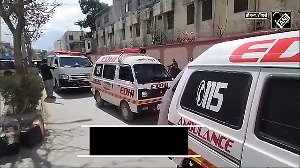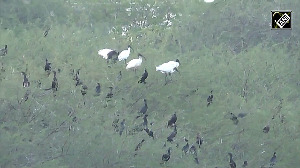President A P J Abdul Kalam on Monday asked political parties and religious leaders to accept the court's verdict on the Ayodhya issue.
"While the judiciary should expedite its work and give an early verdict, it is also necessary for political parties, religious leaders and eminent social personalities to promote an atmosphere of mutual understanding, goodwill and accommodation," Kalam said in his first address to a joint sitting of Parliament on the opening day of the Budget session.
The Ayodhya issue is expected to dominate the Budget session of Parliament.
The President said the government had made it clear that the Ayodhya dispute could be resolved either through negotiations between the two communities or through a verdict of the judiciary, which had to be accepted by all concerned.
Noting that national security was a matter of highest priority for the government, Kalam said, "After the December 13 attack on our Parliament by Pakistan-based terrorists, we were constrained to deploy our troops along the international border."
"This decision achieved its purpose by showing both our firmness and our self-restraint in dealing with our hostile neighbour," he said. He added that in October last year the government, after careful deliberation, decided to "strategically redeploy" the armed forces from their positions.
This, he asserted, was done without compromising on their capacity to respond decisively to any emergency and without lowering their vigil in Jammu and Kashmir.
The President said a comprehensive nuclear doctrine had now been put in place and "this places the ultimate control of our strategic assets in the hands of the civilian political executive."
"The country is truly proud of the scientists, engineers and staff of DRDO for the successful test firing of Agni-1 missile," he said. He also listed DRDO's other accomplishments, including Pinaka -- the indigenously developed area weapon system -- and the supersonic Brahmos missile, jointly developed with Russia and successfully flight-tested.
Kalam said continued incidents of cross-border terrorism in 2002 again underscored that the chief threat to India's internal security was external. "The killings of innocent men, women and children; the choice of members of the families of security personnel as special targets; the attack on pilgrims -- all this showed that there was a method in the madness of Pakistan-supported terrorist violence," he said.
This method, however, did not succeed as "our people maintained calm even in the face of provocative attacks on the Akshardham temple in Gandhinagar and the Raghunath Temple in Jammu."
"However, we must continue to be vigilant against an adversary which is unwilling to give up its anti-India stand," he said.
Accusing Pakistan of not fulfilling its assurances on the issue of cross-border terrorism, Kalam said the infrastructure of terrorist groups remained intact in Pakistan and the funding of terrorist groups continued.
Referring to the problem of illegal migration from Bangladesh, Kalam said the government was determined to take all necessary steps to check this problem.
He said the problem had assumed serious proportions and affected many states. "There have been reports of Bangladesh territory being used by insurgent groups operating in the northeast. The ISI is also active in Bangladesh. This makes the issue of infiltration even more ominous," he said.
Kalam said the state governments should take immediate corrective measures for proper utilisation of the Rs 1,000 crore police modernisation scheme launched two years ago. He said that a multipurpose national identity card project would be started on a pilot basis in 13 states from April 2003.
On the formation of a new government in Jammu and Kashmir, the President said the Centre was fully committed to working closely with it in its efforts to bring peace, normalcy and economic development in the state.
He said the prime minister had announced projects and schemes worth over Rs 6,000 crore covering various aspects of development and security, with a thrust on generation of new
employment opportunities for the youth and relief for migrants affected by militancy and cross-border shelling.
The assembly election in Gujarat have strengthened democracy and ended a sad chapter in the state's history, he said. "We must resolve to ensure that communal violence is never repeated in any part of our country. The government remains committed to secularism," he said.
Pointing out that the government's concerted efforts to rebuild peace in the northeast were bearing fruit, the President felicitated the people of Nagaland whose "yearning for peace" had imparted strong momentum to the Centre's efforts in this direction.
"I also heartily congratulate the Bodo community for the successful conclusion of the peace talks," he said, adding development work in the northeastern region had gathered further momentum.
He said the government would set up a University Development Commission by bringing in necessary amendments to the UGC Act.
"The University Grants Commission, which has completed fifty years, is proposed to be restructured into the University Development Commission," Kalam said.
Prime Minister Atal Bihari Vajpayee had mooted an idea to this effect, while addressing a function recently on the UGC completing its 50 years.
Lauding the Indian Institute of Technology system for having completed 50 years of distinguished service to the nation, the President said it has earned global acclaim for the quality of its graduates.
While 14 Regional Engineering Colleges have been upgraded as National Institutes of Technology, the President said special thrust has been provided to address educational needs of minorities.
He said the country's commitment to the universalisation of elementary education was reflected in its move to make free and compulsory education for all children in the age group of 6-14 years a fundamental right.
Sarva Shiksha Abhiyan, a national programme to discharge this constitutional obligation, has been successfully launched with an outlay of nearly Rs 5,500 crore, Kalam said.






 © 2025
© 2025